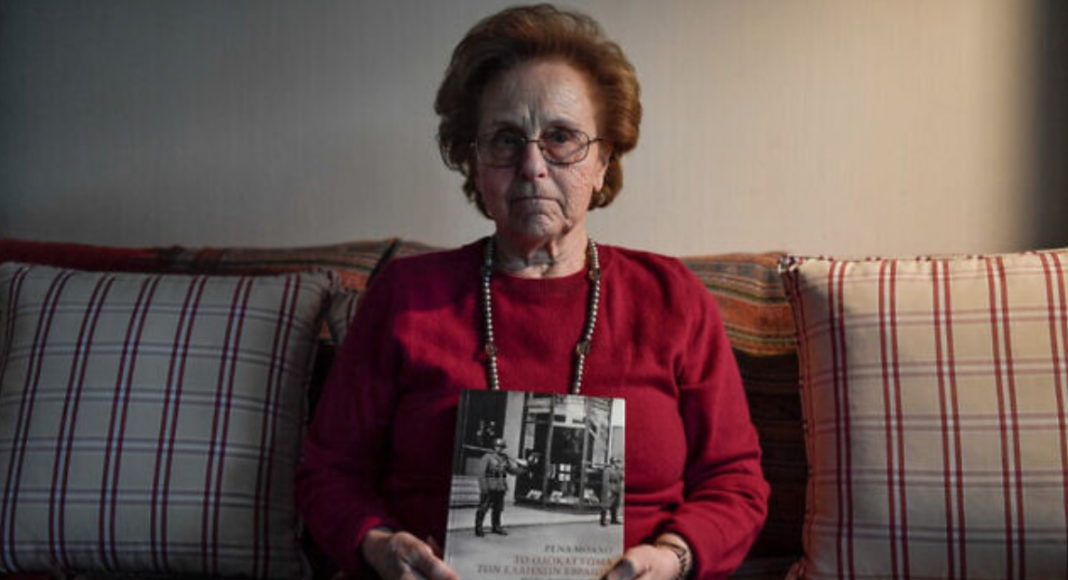“I celebrated my seventh birthday inside the camp of Bergen-Belsen with a piece of bread and sticks for candles,” recalls 83-year-old Lola Angel, one of the few Greek Jews left to remember the horror of the Nazi concentration camps.
“I was just three when I had to hide,” says Nina Camhi, who is 80. “But I still remember the fear.”
Approximately 83 percent of Greek Jews, nearly 59,000 people, were exterminated when the country was occupied by Nazi Germany in 1941-1944.
Most of them came from Thessaloniki, which until then had a prosperous Jewish community dating back to the 15th century, and was known as the Jerusalem of the Balkans.
Nina and Lola are among survivors who have not spoken until now. Because they were so young at the time, they felt it was not their place to speak. But 75 years after the end of World War II, they finally feel ready to pass on their stories to the next generation.
‘I forgot nothing’
“I was but a child but I forgot nothing,” Lola told AFP.
“The memories still haunt me, and the intense smells of the camp are ever-present.”
Lola’s family fled to Athens from Thessaloniki in January 1941, a few months before the capital fell.
In April 1944, the little girl and her family were put on a train to an unknown destination.
“We were packed atop each other and could hardly breathe. Many died en route,” she said.
The intensification and coordination of the “Final Solution” was agreed at a landmark conference of government ministries and top-ranking Nazi and SS officials in the Berlin suburb of Wannsee on January 20, 1942.
The 15 participants at the Wannsee Conference agreed that 11 million Jews should be moved to death camps in an operation under the exclusive authority of the SS.
Jews from all over Europe were systematically deported from mid-1942 to six death camps — Auschwitz-Birkenau, Belzec, Chelmno, Majdanek, Sobibor and Treblinka.
At Auschwitz, more than 1.1 million people were killed, primarily Jews, but also Roma, Soviet prisoners of war and Poles.
At Bergen-Belsen, however, the Nazis tried a different strategy, said Lola, speaking from her Athens apartment where the walls are covered with the pictures of survivors and the dead.
Death by disease
“It was slow death by disease. After the Allies landed in Normandy, the Nazis began concentrating people there, hoping they would die of typhus.”
Her father fell ill with the disease while Lola caught measles.
She said that childhood distractions kept her going.
“I kept my doll until I returned to Greece, and my mother would put a bow in my hair every morning,” she said.
Nina said that in order to evade the first convoys from Thessaloniki to Auschwitz in March 1943, she and her parents and brother fled the city.
A business partner of her father managed to smuggle them by fishing boat to the island of Skopelos.
But her mother’s family died at Auschwitz.
“My mother kept all their letters, up to the point they were deported. After the war, she shut herself up in painful silence,” Nina said.
History lessons
The fate of Greek Jews is still not widely known in the country.
It was only in 2004 that teaching about the Shoah became compulsory in Greece and 10 years later a monument was erected at the site of the former Jewish cemetery which the Germans razed and where the city university now stands.
Just before Bergen-Belsen was liberated in April 1945, Lola was removed by train to north Germany, part of a last-ditch effort by the Nazis to exterminate camp survivors before the Allies arrived.
After days of traveling, the guards abandoned the train and fled. The exhausted and starving prisoners were found by American soldiers a few hours later.
Nina and her parents crossed most of Western Europe — the Netherlands, Belgium, France and Italy — before ending back in Greece in September 1945.
By that point, she had forgotten her Greek, and her family had lost everything.
“We had to start from scratch,” she said.
And returning to Thessaloniki was no easier, with the ghosts of Jewish families staring back from every corner.
“Even today I have nightmares. And I rarely board trains,” she said.
Sourced via The Times of Israel.

